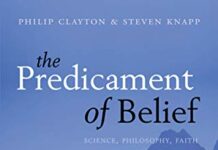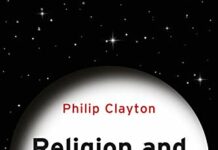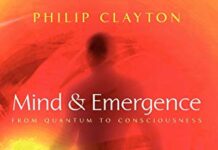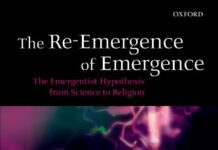
Ebook Info
- Published: 1998
- Number of pages: 288 pages
- Format: PDF
- File Size: 1.42 MB
- Authors: Philip Clayton
Description
It is widely believed that contemporary science has ruled out divine action in the world. Arguing that theology can and must respond to this challenge, Philip Clayton surveys the available biblical and philosophical resources. Recent work in cosmology, quantum physics, and the brain sciences offers exciting new openings for a theology of divine action. If Christian theism is to make use of these opportunities, says Clayton, it must place a greater stress on divine immanence. In response to this challenge, Clayton defends the doctrine of panentheism, the view that the world is in some sense “within” God although God also transcends the world. God and Contemporary Science offers the first book-length defense of panentheism as a viable option within traditional Christian theology. Clayton first defends a “postfoundationalist” model of theology that is concerned more with the coherence of Christian belief than with rational obligation or proof. He makes the case that the Old and New Testament theologies do not stand opposed to panentheism but actually support it at a number of points. He then outlines the philosophical strengths of a panentheistic view of God’s relation to the world and God’s activity in the world. The remainder of the book applies this theological position to recent scientific developments: theories of the origin of the universe; quantum mechanics, or the physics of the very small; the debate about miracles; and neuroscientific theories of human thought.
User’s Reviews
Editorial Reviews: Review Christian Scholar’s Review “Philip Clayton has done the Church and the academy a real service in the publication of this book. . . Clayton sets for himself the task of reflecting on and advancing our conception of God as Christian theologians in the light of contemporary science. He admirably meets this goal and has written a clear, learned, and engaging text. . . Phil Clayton helps us reflect more fully on the manner in which theology and natural science are (and should be) brought into fruitful, mutual engagement. He has provided us with a thoughtful, learned and important book. If we do not always agree with him, one can admire the clarity and insight he brings to the task. The task he set himself, of bringing theology and science into dialogue, is one of the greatest challenges facing the Church in the twenty-first century. I recommend this volume to everyone interested in serious engagement between theology and science.” Cross Currents “An excellent summary of a contribution to the current dialogue over the nature of God’s relation to the world and the problem of divine agency, this erudite and lucid piece of constructive theology was (deservedly) awarded the 1998 Templeton Book Prize in Science and Religion. . . Thinkers across the theological spectrum will learn from and be challenged by this important and highly readable book; it is a model of theological and philosophical argumentation and should not be missed.” Journal of Religion “In this instructive and generally persuasive book, Philip Clayton’s central concern is to develop and defend a model of God, God’s relation to the world, and God’s activity in the world that is both faithful to the Christian tradition and does justice to the contemporary scientific and philosophical context. . . This book provides a cogent argument for a panentheistic solution to the problem, made pressing by modern science, of how to make sense of the claim that God acts in the world.” Perspectives on Science and Christian Faith “I highly recommend this book; it serves as an excellent introduction to many of the important topics in the science/theology reconciliation, while advocating an intriguing solution to some of the inherent problems.” Anglican Theological Review “Clayton brilliantly and clearly addresses key issues that all theists who choose to bring their religious commitments into dialogue with other aspects of culture must face. He carefully outlines a procedure for thinking theologically in a contemporary age, offers valuable descriptions of alternative positions being taken on a number of issues at the junction of theology and science, and boldly states a program to be pursued in addressing the core theological problem: the God-world relationship. . . For those just getting acquainted with the present interdisciplinary discussions between theology and the sciences, God and Contemporary Science offers clear insight into what is at stake and where the big issues are in the relationship between theology and contemporary science.” About the Author Philip Clayton is Ingraham Professor of Theology at the Claremont School of Theology and professor of philosophy and religion at Claremont Graduate University in Claremont, California. He is also the author of Explanation from Physics to Philosophy: An Essay in Rationality and Religion (Yale) and the Templeton Prize-winning book God and Contemporary Science (Eerdmans).
Reviews from Amazon users which were colected at the time this book was published on the website:
⭐Philip Clayton (born 1956) is a contemporary American philosopher of religion and science who currently teaches at the Claremont School of Theology.He wrote in the first chapter of this 1997 book, “I will defend the theses that metaphysical and theological issues are raised by the methods and conclusions of the sciences; that theology and science share some basic principles of rational inquiry in common; that physical determinism and explanatory reductionism have (so far) been unsuccessful, and perhaps that they MUST be so in principle; that the world around us evidences sets of emergent properties that we call ‘life’ and ‘mind’ which exercise a causality of their own; that the entire complex of data and experiences available to us are ultimately better explained in theological language than in the language of materialism and physicalism alone.” (Pg. 7)He continues, “In the following chapters I will argue that two of the most urgent problems raised for theology by modern science are the problems of how to conceive of God’s relation to the world and how, if at all, to conceive of God’s agency in the world…. Gone, it seems, from the popular mind… is the belief that God is constantly involved in changing the outcome of natural processes in the world… The reason is not simply that our knowledge of natural processes and their regularity has increased… Just as much, the change has been brought about by the MINDSET underlying modern science and technology.” (Pg. 9)He clarifies, “the book of Genesis is not to be read as a science textbook. Its lessons are theological; it is not in competition with natural scientific accounts of the origin of the world… Nor should we be over-quick to determine which aspects of this account remain relevant and which not…” (Pg. 30)He observes, “The study of history provides perhaps the most [damaging] indictment of humans’ proclivity toward evil. In historiography we find an all too clear record of what humans are capable of doing to one another and what… the patterns of our interacting have been… Our greatest self-justifications and most noble moments are marred, it appears, by a pervasive selfishness and dishonesty even to ourselves… In fact, it would be possible to show that each of the major loci of the traditional doctrine of the imago dei within humanity finds corresponding expression in the doctrine of the fall.” (Pg. 42-43)He suggests, “we must not separate the world’s ‘space’ from God’s omnipresence. One might worry that pantheism will result, since space (and thus all finite things) are no longer placed outside of God. But pantheism means that NO separation is made between God and the world, whereas I am suggesting that the separation ought to drawn in a different way… This distinction makes it possible to think of god as coextensive with the world… Nonetheless, created space it precisely that—created, contingent…. In short: finite space is contained within absolute space, the world is contained within God; yet the world is not identical to God. Precisely this is the core thesis of panentheism.” (Pg. 90) He adds, “No imagine an ecosystem of ‘all that is’; it too must be more than the sum total of its parts. If you also imagine that its identity is living and conscious, and … that its existence also PRECEDED its being filled with living things, then you will have some sense of the dialectic between God and world envisioned by panentheism.” (Pg. 90-91)He asks, “Is Christianity compatible with pantheism? Ultimately, I do not think so; but… even if pantheism ‘goes too far’ for Christian theology, it stems from motivations that are not utterly foreign to the biblical texts and the theological tradition… In comparison with pantheism, panentheism understands humans and the world to be both MORE and LESS. Less, for we are not God but creation … And yet more: in pantheism all things that appear flow from God and are destined to flow back into God… The core argument aimed to show that panentheism does justice to the movement from polytheism to monotheism, and in fact represents a MORE ADEQUATE completion of this movement than was classical Western theism… it is also better able—and so the thesis of the present work—to address the problem of divine agency in our contemporary scientific and philosophical context.” (Pg. 118-119)He points out, “we have found scientists insisting time and time again that the conditions and constants lie within that one unbelievably narrow range which alone would allow for the eventual emergence of life in the universe. Even those with no theistic leanings and no love for metaphysics speak of the APPEARANCE of teleology or goal-directedness in the universe—although they are quick to add that it is ‘as if’ the initial conditions were set up for a purpose.” (Pg. 157)He notes, “I have suggested that there is a commonsense initial presumption in favor of naturalistic explanations… has the presumption … then continued to increase in a steady climb throughout human history? No, sometimes the task for the defender of divine interventions is easier at a later time than at an earlier time. For example, it is (arguably) easier to make the case for divine actions today than at any time since Newton… The presumption of naturalism varies, then, with the nature of our best account of the world—and with the methods that seem to work for obtaining knowledge of the world—at any given time. We might put this point differently: the most serious presumption of naturalism is methodological.” (Pg. 172-173)He suggests, “it seems to me that a theist might sometimes have good reasons to identify an event as a miracle… My thesis, then, is that believers may form a reasonable JUDGEMENT that God has (say) contributed to the occurrence of a particular event… it would be illicit to forbid the religious believer to draw on what she has experienced in her relationship with God when she is forming judgments about what God has probably done in history in general or at particular moments in history… [But] the presumption in favor of scientific explanations in the natural realm, and an irreducibly subjective component in the case for any specific miracle, keeps us from using the word ‘knowledge’ of traditional miracle claims.” (Pg. 180-181)He argues, “we have found that, despite many thinkers’ intentions to rely on the physical sciences alone, the bothersome problem of THE HUMAN DIMENSION, the so-called problem of consciousness, emerged repeatedly as the linchpin of the entire debate …until one is able to solve the problem of human mental causation—the problem of how human intentions and desires get translated into events in the physical world—one will not be able to develop even a half-way adequate answer to the question of divine causality… For if the human spirit can produce events in the physical world, if our understanding of natural law allows for (or even demands)this type of causality, then divine action could be construed as an analogous mode of change in the physical world… My thesis, in short, is the following: the question of God’s relation to the world, and hence the question of how to construe divine action, should be controlled by the best theories we have of the relationship of our minds to our bodies—and then corrected for by the ways in which God’s relation to the universe must be DIFFERENT from the relation of our mental properties to our brains and bodies.” (Pg. 233)He concludes, “A theory of thoughts (mental predicates) that does not include reference to the active, conscious subject whose thoughts they are is inherently incomplete. Here an especially strong case can be made that the theological account of the human agent provides a needed supplement to recent work in the brain sciences and the philosophy of mind. As a result, we have theological reason to interpret talk of mental causation … in terms of the actions of individual human subjects.” (Pg. 262)This book will be of great interest to those studying the interaction between religion and science.
⭐What a scholarly work! I salute the author Philip Clayton for indepth understand of so many traditions and also science. Kant
⭐Philip Clayton has written an extensive study on how science and theology relate to each other. Not only is the book theologically sound, Clayton reviews a lot of contemporary scientific theories. Especially if you are interested in chaos theory, self-organization, emergence, and its relation to theological reflection about divine action, this book is a must read. It is not for nothing that the famous Templeton Foundation rewarded Clayton with an important prize!
Keywords
Free Download God and Contemporary Science (Edinburgh Studies in Constructive Theology) in PDF format
God and Contemporary Science (Edinburgh Studies in Constructive Theology) PDF Free Download
Download God and Contemporary Science (Edinburgh Studies in Constructive Theology) 1998 PDF Free
God and Contemporary Science (Edinburgh Studies in Constructive Theology) 1998 PDF Free Download
Download God and Contemporary Science (Edinburgh Studies in Constructive Theology) PDF
Free Download Ebook God and Contemporary Science (Edinburgh Studies in Constructive Theology)



